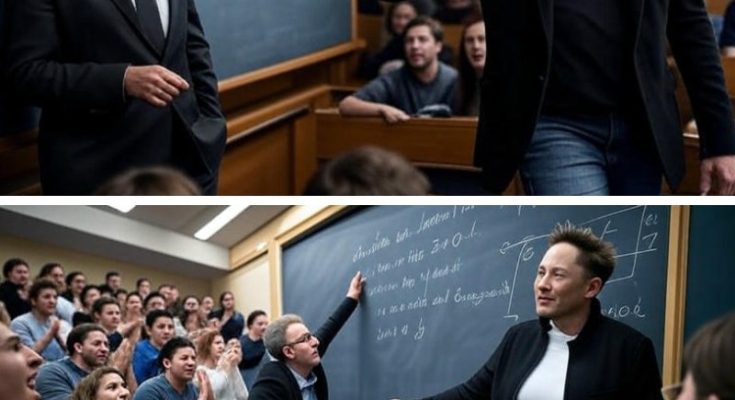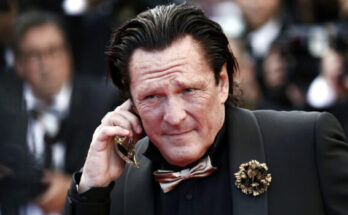

A Public Challenge Turns Into a Humbling Moment
The incident occurred during a special lecture hosted by Stanford’s Department of Mathematics, where Elon Musk, 53, was invited as a guest speaker to discuss the role of mathematics in innovation and technology. Musk, whose net worth exceeds $424.7 billion according to Forbes, has been a polarizing figure in recent years, particularly after his appointment as head of the Department of Government Efficiency (DOGE) under President Donald Trump in early 2025. His involvement in controversial political actions, such as the $1 million voter giveaways in Wisconsin in March 2025, has fueled criticism that he’s more of a lucky opportunist than a genuine intellectual.
Dr. Edward Kline, a 62-year-old calculus professor at Stanford with a reputation for his rigorous teaching style, was among the skeptics. Kline, who has published extensively on applied mathematics and is known for his sharp critiques of Silicon Valley’s tech elite, was a guest panelist at the lecture. During the Q&A session, Kline openly challenged Musk’s intellectual credentials, reportedly saying, “Mr. Musk, you may have billions, but intelligence isn’t something you can buy. I doubt you could solve a basic Harvard problem that my students struggle with.” The comment, met with gasps from the audience, was a direct jab at Musk’s reputation, implying that his success with companies like Tesla, SpaceX, and Neuralink was more about money than merit.
Kline then presented Musk with a challenging math problem—one famously used in Harvard’s Math 55 course, often described as the most difficult undergraduate math class in the world. The problem involved advanced calculus and linear algebra, requiring the solver to compute the eigenvalues of a complex matrix and apply them to a differential equation—a task that typically takes even top students at least 10 minutes to unravel. Kline handed Musk a whiteboard marker with a smirk, saying, “Let’s see if you can handle this in under 10 minutes. I’ll be impressed if you even get halfway.”
What happened next left the room in stunned silence. Musk, dressed in his signature black jacket, took the marker, glanced at the problem, and began scribbling furiously. In just under two minutes, he stepped back, revealing a perfectly solved equation with a clear, step-by-step derivation. The audience erupted in applause, while Kline’s face turned pale. A graduate student in attendance later verified the solution, confirming that Musk’s work was not only correct but also elegantly simplified—a hallmark of true mathematical mastery.

Musk’s Response: A Lesson in Humility
Rather than gloat, Musk responded with characteristic directness. “I don’t need to prove my intelligence to anyone,” he said, addressing Kline and the audience. “But I do need to solve problems—whether they’re on a whiteboard or in the real world. That’s what drives innovation, not assumptions about who’s smart and who isn’t.” He then turned to Kline and added, “Maybe you should spend less time mocking people and more time solving problems yourself.”
The moment was a humbling one for Kline, who later issued a brief apology via Stanford’s faculty newsletter, stating, “I underestimated Mr. Musk’s abilities, and for that, I am sorry. His performance was a reminder that intelligence can manifest in many forms.” However, Kline also doubled down on his broader critique of tech billionaires, arguing in a follow-up interview on May 22, 2025, that “wealth often amplifies the perception of genius, but true brilliance requires more than money and a quick mind.”
Musk’s ability to solve the problem so quickly shouldn’t come as a surprise to those familiar with his background. He scored a 1400 on his SATs in the late 1980s, which correlates to an IQ in the mid-130s—a score well above average. Musk also holds a bachelor’s degree in physics from the University of Pennsylvania and was accepted into a materials science PhD program at Stanford in the 1990s before dropping out to pursue his entrepreneurial ventures. His autodidactic approach to learning—seen in how he taught himself rocket science to found SpaceX—has long been a cornerstone of his success.
A Deeper Look: Musk’s Mathematical Prowess
Musk’s mathematical skills have been a topic of fascination for years, often overshadowed by his more controversial actions. In a 2017 interview at a TED conference, Musk explained his problem-solving approach, emphasizing the use of first-principles thinking—a method that breaks down complex problems into their fundamental components. This approach, which he applied to the Harvard problem, is evident in his work across industries. For example, when founding SpaceX, Musk famously created a spreadsheet on a flight back from Moscow in 2002, calculating the costs and performance characteristics of a rocket to undercut existing launch companies—a feat that left aerospace engineers stunned.
Critics, however, have long questioned Musk’s intelligence, often pointing to his controversial statements and actions as evidence of incompetence. In a 2025 post, a writer argued that Musk’s IQ is likely between 100 and 110, claiming there’s “zero evidence” of higher intelligence in his biography. Others have called Musk “an idiot” who relies on others to do the real work, citing his tendency to take credit for innovations at Tesla and SpaceX. Yet, Musk’s performance at Stanford directly contradicts these claims, showcasing a raw intellectual ability that even his detractors cannot deny.
Public Reaction: A Viral Moment Sparks Debate
The incident has sparked a firestorm of reactions online, with social media platforms buzzing with commentary. Many users praised Musk’s quick thinking, with one post stating, “Elon Musk just proved he’s not just a billionaire—he’s a genius. That professor got what he deserved!” Others, however, sided with Kline, arguing that Musk’s wealth and resources give him an unfair advantage. “Sure, Musk solved the problem, but let’s not pretend he’s some math prodigy. He’s had decades to prepare for moments like this,” another user wrote.
The event has also reignited broader debates about intelligence and success. Some argue that Musk’s ability to solve the problem is less about raw intellect and more about his relentless drive to prove himself—a trait that has defined his career. As one commentator noted in a 2025 article, Musk’s brilliance lies not just in his IQ but in his ability to build organizations, identify talent, and solve real-world problems. “IQ is not a great measure of competence at the kind of things Elon is best at—building and improving organizations, identifying talent, managing large numbers of people,” the article stated, a sentiment that resonates with Musk’s performance at Stanford.
A Broader Reflection: Wealth, Intelligence, and Assumptions
The Stanford incident raises deeper questions about the assumptions society makes about wealth and intelligence. Musk’s critics often dismiss him as a product of luck and privilege, pointing to his early success with Zip2 and PayPal as a result of the dot-com boom rather than personal brilliance. Yet, his ability to solve a Harvard-level math problem in two minutes challenges this narrative, proving that his success is not solely a product of financial resources but also of intellectual capability.
At the same time, Kline’s initial mockery reflects a common bias against billionaires in tech, many of whom are seen as overhyped figures whose wealth overshadows their actual abilities. The incident serves as a reminder that intelligence can manifest in unexpected ways, and that dismissing someone based on their public persona—or their bank account—can lead to underestimating their true potential.
A Moment That Redefines Musk’s Legacy
As of May 23, 2025, the Stanford showdown continues to dominate headlines, with videos of Musk solving the problem amassing millions of views online. For Musk, the moment is a vindication of his intellectual credentials, a rare public display of the raw talent that has driven his success across industries. For Dr. Edward Kline, it’s a humbling lesson in humility, a reminder that assumptions can lead to embarrassment when proven wrong.
The incident may not silence Musk’s critics, but it adds a new chapter to his complex legacy—one that showcases his ability to rise above mockery and prove his detractors wrong, one equation at a time. As the world watches Musk navigate his role in the Trump administration, his business ventures, and now this viral moment, one thing is clear: underestimating Elon Musk is a mistake that comes with a steep price, whether on a whiteboard or in the global arena.



